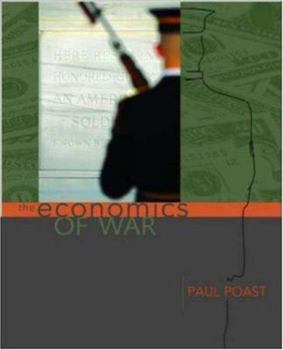The Economics of War
Ancient Greek historian Thucydides once remarked, War is a matter not so much of arms as expenditure, through which arms can be made of service. In recognition of the centrality of economics to issues... This description may be from another edition of this product.
Format:Paperback
Language:English
ISBN:007313399X
ISBN13:9780073133997
Release Date:May 2005
Publisher:Irwin/McGraw-Hill
Length:218 Pages
Weight:1.10 lbs.
Dimensions:0.3" x 8.1" x 10.0"
Customer Reviews
4 ratings
Excellent Exploration
Published by Thriftbooks.com User , 16 years ago
This book is a very well explored analysis and his conclusions on why the misconception that war is the best way to create a strong economy are factual and well thought out. The book is designed as a textbook for people with limited previous contact with economic concepts, which can be slightly annoying at times. None the less it is a perfect introductory book on the subject of economics and war for those who wish to explore but lack the economic background to just pick up something more in depth.
The Economics of War by Paul Poast
Published by Thriftbooks.com User , 18 years ago
I write this from UK. I wish to buy this book. I wish to know whether it avialble in UK. with thanks, thomasebastian19@yahoo.com
A good introductory textbook written for a new subject
Published by Thriftbooks.com User , 19 years ago
I attended the "Economics of War" class taught by Prof. Poast. When I was in the course, we did not use this text, but instead were using his personal notes. I think its no suprise that this textbook stemmed from those notes (Since this is the genesis of most textbooks out in the market). That being said, I have since purchased the book for my personal collection and after reading (and comparing) with my old class notes my opinion is still the same; they are clear and concise exposition on a young and very interesting (and increasingly relevent) subject. The prerequisites to understand this text are very minnimal and hence can drawl a large potential of readers. Essentially, basic familiarity of Macro (and some Micro) economics should prove suffecient. Of course the more you have under your belt, the more you'll gain from the text, but its possible for people of other "related" fields to read this text and understand its implications (such as Political Science/IR/Any other allied social science). On the text itself, it is a surevey of the the consequences of war on the US economy. The coverage of the book spans from a basic treatment of the theory of war economies, to case studies (of the major wars, ethnic clensings etc.), to studies of labor economics of soldiers, weapons of mass destruction proliferation, and terrorism (to name a few of the topics). The author utilizes some standard tools of economist to show why some policies (like the draft) are unfavorable, as well as why suicide bombings may be "rational" (I use that word in the non-colluqiol sense). I was very satified with the course and this book in general (and what about the affordable price?). Yet, there are some things which I think should be improved on for the next edition of this text. Since this subject is relatively young (I think this book may be the first of its kind at the undergraduate level), it is easy to forgive the author on any grievances. The 'grievances' I have with this book have nothign to do with the the "meat" of the text, just the quantity of "meat" contained in the pages this book. In general, I think more topics should be covered in this textbook, and certain topics should be covered in much more detail. I would like to see more models and theory in the weapons of mass destruction proliferation section. The section as it is covers which nations have/had/suspected to posses[ed] WMD. Then it goes over the Q50 (Operations cost of a particular WMD agent to eleminate 50% of the population in a given area) cost to explain why countries would want to possess certain WMD for defense. After this, the text explains the process that is required to go create HEU. Then the text goes into a simple 2-nation market bartering model with respect to Nuclear weapons. What would have been more intresting would be to perhaps add too (or create) a section on the specific strategy of nuclear warfare. I know some conventional tactics models have been introduced in Issac
Great text book! But one thing missing.
Published by Thriftbooks.com User , 19 years ago
This is a great textbook, that uses examples of war to explain various concepts of economics. It should have come as natural, and I'm surprised that no one came up with it before. War is one of the biggest public spending, which makes it great material to talk about macro economic issues. Game theory analysis came out from cold war strategic analysis, so it's only natural that you use that example to explain game theory. Arms industry is huge and its clients are limited, so use it as an explanation for market monopoly and industrial structure. Seems really obvious once you read it, but it's good. The book is written clearly, and has no political agenda. It's analysis of war impact is clear, and anyone who wants a level headed argument on war should read this before becoming too emotional. Also, it's an interesting way to study economics. There's one big omission in the analysis, though, in my opinion. It doesn't touch upon the essential question: what happens when you lose the war? War here is treated as a big spending. You go into a war, and spend a lot of money, incurr a lot of damage. That's it. Of course, I understand the limitation as an economics textbook. Including this aspect would make the analysis a bit messy. But still, I'd say that's a major issue.






